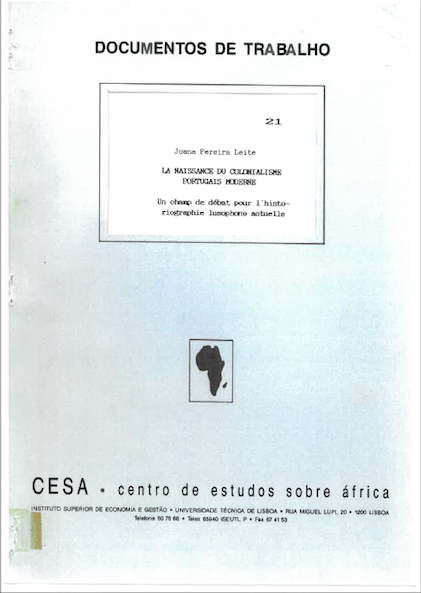Working Paper 21/1991: La naissance du colonialisme portugais moderne: un champ de débat pour l’historiographie lusophone actuelle

Title: Working Paper 21/1991: La naissance du colonialisme portugais moderne: un champ de débat pour l'historiographie lusophone actuelle
Author(s): Leite, Joana Pereira
Publication Date: 1991
Publisher: ISEG - CEsA
Quotation: Leite, Joana Pereira. 1991. “La naissance du colonialisme portugais moderne : un champ de débat pour l'historiographie lusophone actuelle”. Instituto Superior de Economia e Gestão. CEsA – Documentos de Trabalho nº 21/1991.
Abstract: L'intention de "faire l'histoire" de la politique coloniale portugaise nous porta au coeur d'un débat, centre de l'historiographie lusophone: la problèmatique des "origines du colonialisme portugais moderne" ou "The Third Portuguese Empire". Ces nouvelles interprétations trouvent, A notre avis, leurs racines dans les "anciens" débats sur la problématique de la "genèse de la decadence portugaise", notamment chez Jes historiens lusophones du XVIII et du XIXème siècles. Les origines de la colonisation portugaise moderne ne pourront pas se comprendre en dehors de la dynamique de la société portugaise au XIXème siecle. Ainsi, l'histoire du colonialisme portugais en Afrique est elle fortement tributaire des analyses proposées par l'historiographie actuelle sur le XIXème siecle au Portugal. Nous avons pas l'intention de concilier les deux positions dont nous venons de parler. Cependant, nous ne résistons pas à la tentation de rappeler ici que s'il est vrai que les intérêts economiques existaient dans la colonisation africaine moderne et ce sous couvert du respect historique qu'il fallait rendre aux héros des découvertes (clés de voûte de l'idéologie coloniale pendant toute l'histoire de l'Empire portugais), la fragilité portugaise dans les négotiations qui ont abouti au partage était tout aussi vraie. D'ailleurs, le Portugal a toujours mis en avant son droit historique sur les possessions africaines, faute de pouvoir s'imposer par les "armes economiques". Nous aurons l'occasion de rappeler com bien cet te position, par rapport aux droits historiques, s'est maintenue pendant toute la période coloniale, devenant par là même une valeur supérieure de l'ideologie salazariste.
Identifier: http://hdl.handle.net/10400.5/24188
Category: Working paper
Abstract:
The intention to “make history” of Portuguese colonial policy brought us to the heart of a debate, the centre of Portuguese-speaking historiography: the problematic of the “origins of modern Portuguese colonialism” or “The Third Portuguese Empire”. These new interpretations have, in our opinion, their roots in the “old” debates on the problematic of the “genesis of Portuguese decadence”, especially among the Portuguese-speaking historians of the XVIII and XIX centuries. The origins of modern Portuguese colonisation cannot be understood outside the dynamics of Portuguese society in the 19th century. Thus, the history of Portuguese colonialism in Africa is highly dependent on the analyses proposed by the current historiography of the 19th century in Portugal. It is not our intention, in La naissance du colonialisme portugais moderne: un champ de débat pour l’historiographie lusophone actuelle, to reconcile the two positions mentioned above. However, we cannot resist the temptation to recall here that if it is true that economic interests existed in modern African colonisation, and this under the guise of the historical respect that had to be paid to the heroes of the discoveries (keystones of colonial ideology throughout the history of the Portuguese Empire), the Portuguese fragility in the negotiations that led to the partition was just as true. Moreover, Portugal always put forward its historical right to its African possessions, as it was unable to impose itself through “economic arms”. We shall have the opportunity to recall how this position, in relation to historical rights, was maintained throughout the colonial period, becoming a superior value of the Salazarist ideology.
Quotation:
Leite, Joana Pereira. 1991. “La naissance du colonialisme portugais moderne : un champ de débat pour l’historiographie lusophone actuelle”. Instituto Superior de Economia e Gestão. CEsA – Documentos de Trabalho nº 21/1991.





